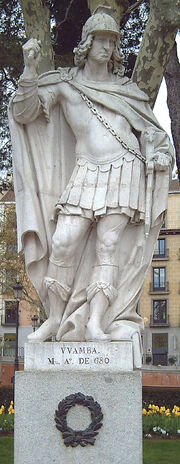
A statue of Wamba
Flavius Wamba (AD 625-690) (Gothic: 𐍅𐌰𐌼𐌱𐌰) was King of the Visigoths from AD 672 and Roman Emperor in the West from 674 until his abdication in 687. He is remembered for temporarily reuniting the West and ushering in a new golden age of European civilization.
The Legend[]
Wamba was born into a peasant family in a Baetican village in 625, where he lived the first half of his life as a husbandman. Over the years he, through prudence and common sense, grew to be moderately wealthy in his village and highly respected for his wisdom.
In those days, when a king died and left no son, the Goths elected a new one, seeking their best and worthiest, and holding the election in the place where the old king had died. It was in the little village of Gerticos, some eight miles from the city of Valladolid, that King Recceswinith had sought health and found death. Hither came the electors,—the great nobles, the bishops, and the generals,—and here they debated who should be king.
Saint Leo, declaring he had been given divine guidance, instructed the electors to seek out a husbandman named Wamba. So scouts were dispersed throughout the land until, at length, Wamba was found tilling one of his fields.
- "Leave your plow in the furrow", they said to him; "nobler work awaits you. You have been elected king of Hispania."
- "There is no nobler work", answered Wamba. "Seek elsewhere your monarch. I prefer to rule over my fields."
- The astonished heralds knew not what to make of this. To them the man who would not be king must be a saint—or an idiot. They reasoned, begged, implored, until Wamba, anxious to get rid of them, said:
- "I will accept the crown when the dry rod in my hand grows green again,—and not till then."
Then a miracle happened. After he thrust it into the ground, all were astonished to see it suddenly become a green plant with leaves growing out of the top. Heaven had decided the matter. So Wamba went with the heralds to the electoral congress. Once there, however, he again tried to refuse the throne. At this, one of the Visigothic chieftains drew his sword and threatened to behead Wamba if he didn't accept the crown. Wamba relented and consented.
Reign[]

Wamba's empire is coloured in orange.
At this time Gregorius was emperor in the West, but controlled only Italy and Africa. Buoyed by his successes against the Bulgars and against the empire in the East, Gregorius deemed that the time had come to reconquer all the lost Roman territories.
In 673 Gregorius attacked the Burgundians, who were allies of the Visigoths. The Burgundian king was defeated and fled to Wamba's court, and Wamba prepared for war against the Romans. In June of that year, having gathered all his warriors and bondsmen together and joining them to the remnant of the Burgundian army, Wamba marched north to meet his enemy.
By August Wamba had decisively defeated Gregorius at the Battle of Aquae Sextiae and then besieged the Romans in the town of Arelate. Disease was far more deadly than any weapon of steel in those days, and when Gregorius died of the plague in early November the Roman army surrendered.
As the news spread so too did chaos throughout the Western empire, as many a general and petty official competed for the imperial title for themselves. When Wamba launched a retaliatory invasion of Italy the following year none of them proved able to put up much resistance, and by midsummer he was preparing to lay siege to Rome itself.
Somewhat unusually for two such powerful officials, Pope Adeodatus and Exarch Gennadius of Africa had played no part in the power games, and together they proposed a solution to the two great threats - the civil wars and the Visigoths. Wamba was renowned far and wide for being a wise and just king to his own people, and not one to exact revenge for no purpose. On June 4th, at the Pope and Exarch's urging, the Senate offered the imperial dignity to Wamba as Roman Emperor in the West.
As emperor Wamba was everything the Senate had hoped he would be. He allowed Romans and Goths to follow their own laws and yet have equal rights under both systems; he extended religious toleration to Catholics, Arians, Muslims and even pagans; he strengthened the fleet and restored the Mediterranean trade routes; and he forced the Franks of Lugdunensis and the Croats of Dalmatia to recognise his overlordship. In 679 he even sent Dumnonia military aid in return for tribute, which allowed the Britons to gain victory at the Battle of Penn Hill and finally drive the Saxons out of southern Britain.
Later life and legacy[]
In 687 Egica, the nephew of Wamba, plotted to overthrow the king-emperor by shaving his head whilst asleep. Under Visigothic law, a shaved head was the sign of a monk and Wamba could not therefore be king. Happy to be relieved of his duties, Wamba gladly abdicated the emperorship as well in favour of Egica and retired to the monastery of St. Giles, where he died peacefully in 690.
Through his grandson Ardo, Wamba was the founder and eponymous ancestor of the Wambid Dynasty that would later come to rule many other realms in Europe, and which still survives today in the form of its Misratan and Memphite branches.
